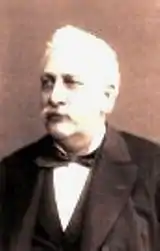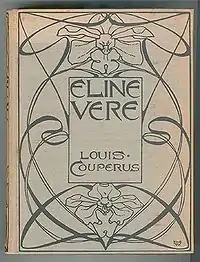 | |
| Established | 1883 |
|---|---|
| Location | Surinamestraat 20, The Hague |
| Type | Townhouse |
| Visitors | Not allowed because the building is owned by the government of Egypt |
52°5′23″N 4°18′27″E / 52.08972°N 4.30750°E
Surinamestraat 20 in The Hague is the location of the house where the Dutch writer Louis Couperus wrote his novel Eline Vere. The father of Couperus, John Ricus Couperus (1816-1902) gave orders to build this house; he first sold his estate "Tjicoppo", which was located near Buitenzorg in the Dutch East Indies and then returned to the Netherlands, where he and his family moved into this house. John Ricus Couperus lived here until his death in 1902 and then the house was put up for sale.
History
The Couperus family started living in this house in 1884 and between 1887 and 1888 this was the place where Louis Couperus wrote his novel Eline Vere. After the death of John Ricus Couperus the house was put up for sale and in 1903 bought by lawyer and writer Conrad Theodor van Deventer.[1] He died in 1915 but his widow lived in the house until 1927, when the house was sold to the Egyptian embassy.[2] From this date until August 2009 the house remained in use as such, when it was put up for sale.[3] Some parts of the house are still authentic and have not been changed over the years.
When the house came on the market in 2006 professor Arnold Heertje, a Dutch economist, the Dutch writers Hella Haasse and Arnon Grunberg and others tried to gather funds to buy the house and keep it for the public. Later a foundation, called Stichting Couperus Surinamestraat was founded; its main aim was to create a Louis Couperus Museum within the house. However the foundation failed to achieve this goal because it could not find sponsors that would donate the 3 million Euro, which was necessary to buy the house.[4] Dutch minister Ronald Plasterk was asked for help but he refused to donate funds to buy the house because he thought that the Nederlands Letterkundig Museum (the Dutch Literature Museum, located at the National library) proved enough honour to support the heritage of Couperus.[5][6] Today, the house is still for sale.
 John Ricus Couperus, lawyer and father of Louis Couperus lived here from 1884-1902
John Ricus Couperus, lawyer and father of Louis Couperus lived here from 1884-1902 Mrs John Ricus Couperus, mother of Louis Couperus
Mrs John Ricus Couperus, mother of Louis Couperus Louis Couperus wrote Eline Vere in this house
Louis Couperus wrote Eline Vere in this house Eline Vere was written in this house in 1887-1888
Eline Vere was written in this house in 1887-1888 Lawyer and member of parliament Conrad Theodor van Deventer lived here from 1904-1915
Lawyer and member of parliament Conrad Theodor van Deventer lived here from 1904-1915
References
- ↑ (in Dutch) De Tijd, August 22, 1914
- ↑ (in Dutch) De Tijd, April 25, 1929
- ↑ (in Dutch) Louis Couperus Stichting
- ↑ (in Dutch) Louis Couperus Erfenis in De Bibliotheek
- ↑ (in Dutch) Geen Louis Couperushuis in Den Haag, in Historiek, April 10, 2010
- ↑ (in English) Surinamestraat 20